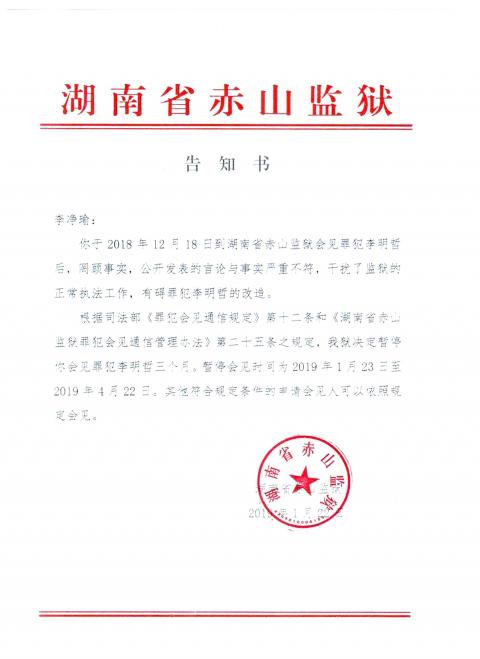Chinese prison authorities have barred Lee Ching-yu (李凈瑜) from visiting her husband, jailed human rights advocate Lee Ming-che (李明哲), for three months.
Lee Ming-che was in 2017 sentenced to five years for “subversion of state power.”
In a letter dated Tuesday last week, Chishan Prison in China’s Hunan Province said that after Lee Ching-yu visited her husband on Dec. 18, she made public comments that greatly deviated from the facts.

Photo courtesy of Taiwan Association for Human Rights
She interfered with the normal exercise of the prison’s law enforcement duties and hindered Lee Ming-che’s rehabilitation, it said.
Citing Chinese regulations, the prison said that Lee Ching-yu’s visitation rights would be suspended from Wednesday last week until April 22.
Other individuals who meet the prison’s conditions for visitation and apply to visit would be permitted, in line with the regulations, it added.
At a news conference in Taipei on Dec. 24, Lee Ching-yu said that her husband was being treated inhumanely at the prison.
Lee Ming-che was being forced to work more than 10 hours a day without any rest days, his warm clothing had been thrown out by prison officials, they served him spoiled food and his bank account had been frozen, Lee Ching-yu told reporters.
Her requests to visit her husband had been denied multiple times before she was finally allowed the visit in December.
Her most recent request to visit her husband was rejected, the Straits Exchange Foundation said on Friday.

Alain Robert, known as the "French Spider-Man," praised Alex Honnold as exceptionally well-prepared after the US climber completed a free solo ascent of Taipei 101 yesterday. Robert said Honnold's ascent of the 508m-tall skyscraper in just more than one-and-a-half hours without using safety ropes or equipment was a remarkable achievement. "This is my life," he said in an interview conducted in French, adding that he liked the feeling of being "on the edge of danger." The 63-year-old Frenchman climbed Taipei 101 using ropes in December 2004, taking about four hours to reach the top. On a one-to-10 scale of difficulty, Robert said Taipei 101

Nipah virus infection is to be officially listed as a category 5 notifiable infectious disease in Taiwan in March, while clinical treatment guidelines are being formulated, the Centers for Disease Control (CDC) said yesterday. With Nipah infections being reported in other countries and considering its relatively high fatality rate, the centers on Jan. 16 announced that it would be listed as a notifiable infectious disease to bolster the nation’s systematic early warning system and increase public awareness, the CDC said. Bangladesh reported four fatal cases last year in separate districts, with three linked to raw date palm sap consumption, CDC Epidemic Intelligence

Taiwanese and US defense groups are collaborating to introduce deployable, semi-autonomous manufacturing systems for drones and components in a boost to the nation’s supply chain resilience. Taiwan’s G-Tech Optroelectronics Corp subsidiary GTOC and the US’ Aerkomm Inc on Friday announced an agreement with fellow US-based Firestorm Lab to adopt the latter’s xCell, a technology featuring 3D printers fitted in 6.1m container units. The systems enable aerial platforms and parts to be produced in high volumes from dispersed nodes capable of rapid redeployment, to minimize the risk of enemy strikes and to meet field requirements, they said. Firestorm chief technology officer Ian Muceus said

MORE FALL: An investigation into one of Xi’s key cronies, part of a broader ‘anti-corruption’ drive, indicates that he might have a deep distrust in the military, an expert said China’s latest military purge underscores systemic risks in its shift from collective leadership to sole rule under Chinese President Xi Jinping (習近平), and could disrupt its chain of command and military capabilities, a national security official said yesterday. If decisionmaking within the Chinese Communist Party has become “irrational” under one-man rule, the Taiwan Strait and the regional situation must be approached with extreme caution, given unforeseen risks, they added. The anonymous official made the remarks as China’s Central Military Commission Vice Chairman Zhang Youxia (張又俠) and Joint Staff Department Chief of Staff Liu Zhenli (劉振立) were reportedly being investigated for suspected “serious